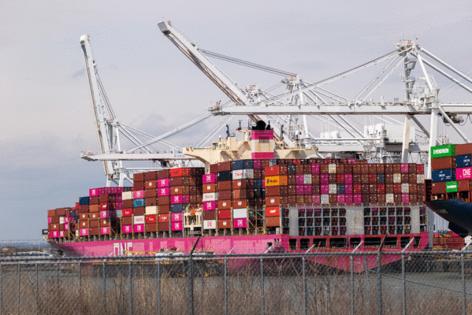Commentary: Tariffs on meds will make America sick
Published in Op Eds
During the past few weeks, President Donald Trump’s on-again, off-again tariff wars have rattled the stock market, decimated many Americans’ retirement funds and promised to send grocery prices soaring — and his administration hasn’t even gotten to critical pharmaceutical tariffs yet. But that will likely be the next shoe to drop.
Trump exempted pharmaceuticals from his first round of tariffs in early April, but recently declared that he intends to impose “a major tariff” on imported medicines “very shortly.”
These tariffs, he claims, will prompt pharmaceutical companies to leave countries including China and India and begin “opening up their plants all over the place.”
Commerce Secretary Howard Lutnick said in a television interview in mid-April that these tariffs are coming in the “next month or two.”
What will this mean for Americans?
The majority of brand name drugs used in the United States are imported. Even generic drugs often rely on ingredients and direct imports from China, including pain relievers and cardiovascular drugs used by millions. The United States was already facing a drug shortage crisis before Trump’s tariff announcement — now, his policies will drive up not only the cost of medicines, but also other health care items such as X-ray machines and medical instruments.
Already, Americans already pay two to three times more for prescription drugs than other developed countries. More than half of U.S. adults say they’re worried about being able to afford their medications. Now compound that by skyrocketing costs of basic drug ingredients and increased costs of finished pills.
Trump cannot just stomp his feet and make domestic pharmaceutical manufacturers suddenly open dozens of new manufacturing plants. Opening a single new manufacturing facility and making sure it is able to meet high quality standards for pharmaceutical production can cost up to $2 billion and take five to 10 years. And pharma companies won’t make that investment unless it is cost-effective and furthers their own profits — which will definitely pass on even higher drug costs to consumers.
Trump’s proposed drug tariffs also threaten the nation’s pandemic preparedness. Key active pharmaceutical ingredients for COVID-19 treatments such as remdesivir, key influenza drugs such as oseltamivir and other respiratory virus therapies depend heavily on Chinese and Indian production. Tariffs will force pharmaceutical companies to slash inventories or seek costly alternatives.
With only 53% of U.S. generic drug ingredients produced domestically, we will face imminent shortages if we tariff drug ingredients. With shortages in supply will come higher costs, and higher costs will lead to people skipping doses or forgoing critical medicines altogether — which will ultimately lead to more emergency care costs from heart attacks and strokes that would otherwise have been prevented.
While we face this pointless standoff between Trump and other countries, entire industries and people’s lives are on the line. Think about the patients who will die if their medicine costs go up by 50% or even 100%. How many of us can absorb that expense, especially for seniors living on a fixed income? What if you have a chronic condition and face these added taxes monthly? Weekly? Daily? What if your retirement savings already took a hit in the Trump market chaos, and you’re bracing for the costs of groceries and daily living expenses to rise as well?
China currently manufactures Stanley tumblers for $1 a piece and Nike shoes for $10 — they sell for $50 and $150, respectively. Now translate these margins to raw ingredients and finished pill manufacturing costs if the U.S. were to domestically produce all Chinese-made medicines. Plus, not forget the added toxic pollution from drug factories that the U.S. consumer avoids as well from manufacturing abroad. Altogether, American patients benefit from global trade.
Trump’s tariffs punish U.S. patients, revealing a cold calculus where corporate profit trumps human lives.
Prior to Trump’s return to office, the United States was well on its way to lowering prescription drug costs. The Inflation Reduction Act allowed Medicare to finally negotiate for lower drug prices.
But Trump’s tariffs will send prices soaring, and cause critical shortages of life saving medicines that treat diabetes, heart disease, cancers and more. The people who can least afford it will suffer, and some will not survive.
____
Dr. Eric Feigl-Ding (follow on X: https://x.com/drericding) is an epidemiologist, health economist and chair of the Department of Public Health at the New England Complex Systems Institute. This column was produced for Progressive Perspectives, a project of The Progressive magazine, and distributed by Tribune News Service.
___
©2025 Tribune Content Agency, LLC.




























































Comments